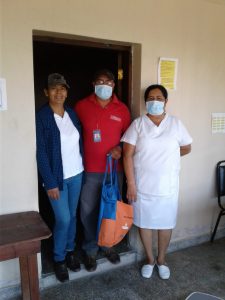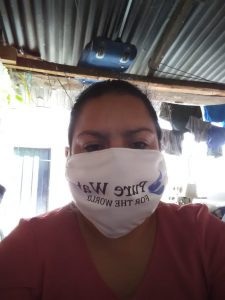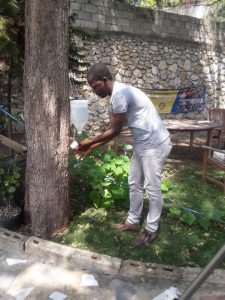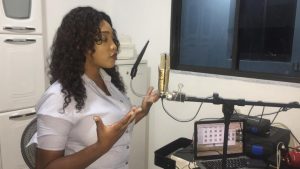In an effort to keep you updated about how the people of Haiti and Honduras are doing during the continued spread of the COVID-19 pandemic, we’ve asked our teams to share. Here are their updates:
Honduras
“We are not going to wait for things to happen,” says Maria Inestroza, Honduras Country Director. “We are doing whatever is in our hands or resources to make things happen, including finding innovative measures to keep supporting our communities so they can stay healthy.”
“We feel very good because we have contributed to creating the habit of washing hands in more than 125 communities located in the very rural, underserved region of Trojes,” Maria continues. “So we can feel confident that these children and families have the tools and knowledge they need to effectively use this protector against COVID-19.”
Here is an overview of what PWW Honduras has been up to this week.
 The team is working closely with training partner, CAWST (Centre for Affordable Water and Sanitation Technology) to put together four radio and television public service announcements (PSAs).
The team is working closely with training partner, CAWST (Centre for Affordable Water and Sanitation Technology) to put together four radio and television public service announcements (PSAs).- Because of the essential training PWW provides, the mayor of the community of Maraita is allowing PWW Health Promoter, Samuel Garcias (pictured middle right), to continue working on water and sanitation projects at local schools (which currently have no students), as well as work with the local health teams to deliver trainings about COVID-19 and the importance of washing hands properly to community members.
- Ostillio Ramirez, PWW Health Promoter, created this video to teach people how to make a simple handwashing tool at home. The video is being shared with other organizations. We encourage you to share it with others you may know will benefit from it. It’s in Spanish.
 Oscar Rene Ventura, PWW Health Promoter, has been busy finding resourceful solutions for people to do while they are at home, including addressing standing wastewater on their properties. Dengue fever (caused by mosquitoes) continues to be a problem for families in rural Honduras. This video demonstrates a pilot project he has created.
Oscar Rene Ventura, PWW Health Promoter, has been busy finding resourceful solutions for people to do while they are at home, including addressing standing wastewater on their properties. Dengue fever (caused by mosquitoes) continues to be a problem for families in rural Honduras. This video demonstrates a pilot project he has created.- Karla Vargas, PWW Health Promoter in Honduras, who is also quite crafty (she created the pattern PWW uses to teach girls and women how to make reusable menstrual pads) has created PWW face masks for the Trojes team (see photo on right).
- Xenia Castellanos, PWW Trainer in Honduras, has put together this hand-washing video. Again, please feel free to share with others.
The team is continuing to work toward developing virtual workshops and webinars, so they are able to get critical training out to other organizations, government agencies, health centers and businesses.
Unfortunately, the numbers in Honduras continue to rise. As of today, there are 219 cases, up from 27 just over one week ago, and 14 confirmed deaths. Please keep the people of Honduras in your thoughts.
Haiti
This week, the team in Haiti has also worked on creating a video for people to build a TipiTap handwashing station at home (see Laura recording audio on right). They are working on networking and identifying the most effective ways of distributing this critical information.
The safe water and hygiene programs the PWW team has already implemented, in thousands of Haitian homes, are absolutely essential to protecting those families during this pandemic.
The PWW team is reaching out to the established Community Agents (volunteers who serve as an extension of the PWW team, supporting 3-5 families in their respective communities with their safe water and hygiene programs) to provide additional support related to COVID-19.
Junior Seraphin, WASH Training Coordinator, shares his thoughts about COVID-19 in Haiti…
“In Haiti, the government has acted with the President declaring a state of health emergency and requiring the closure of schools, universities, factories and places of worship, banning gatherings of more than 10 people. The airport and seaports are closed, except for the transportation of goods. There is a mandatory night curfew from 8 pm to 5 am.
As I write this text on COVID-19, I am afraid. I am afraid for my family. I am afraid for my work colleagues. I am afraid for friends and even for adversaries. If the developed countries, like the United States, France, Italy, Canada, Spain and Germany, which already have sanitary infrastructures are impacted so heavily by COVID-19, what does this mean for Haiti, which was not ready for Cholera in 2010?
At this time, the markets are still functioning as people have to make money in order to survive. TapTaps [public taxis] are serving passengers that must get to work. There is not an understanding of the need for social distance. If changes don’t happen soon, it has the potential to be catastrophic with unimaginable consequences related to the number of infected cases and deaths that we will have.
Our team is committed to doing all we can to help. May God protect Haiti and all other countries.”
 Today, there are 16 reported cases of COVID-19, though testing is limited. Health resources are a major concern as are the ability for most Haitians to implement protective practices, including handwashing and social distancing. Port-au-Prince has almost 3 million residents, with upwards of 500,000 living in very tight quarters in Cité Soleil, the Western Hemisphere’s poorest slum. It is estimated that the country has 124 ICU beds and 64 ventilators to serve a population of almost 11 million. (source)
Today, there are 16 reported cases of COVID-19, though testing is limited. Health resources are a major concern as are the ability for most Haitians to implement protective practices, including handwashing and social distancing. Port-au-Prince has almost 3 million residents, with upwards of 500,000 living in very tight quarters in Cité Soleil, the Western Hemisphere’s poorest slum. It is estimated that the country has 124 ICU beds and 64 ventilators to serve a population of almost 11 million. (source)
The PWW team in Haiti is working hard to come up with creative solutions and will continue to do all it can to reach underserved families with critical messages, encouraging handwashing and social distancing practices that can save lives.
Please keep the people of Haiti in your thoughts.
You can help. Your financial support during this critical time will help to ensure our ability to maintain staff and bring critical, life-saving hygiene education and resources to people in need. Donate here.
NOTE: The newly released CARES Act allows for non-itemizer deductions of up to $300 for 2020 (claimed on tax forms next year) and lifts the existing 60% income cap on annual contributions for those who itemize in 2020. It also raises the annual limit for corporate donations from 10 percent to 25 percent. Please consult your tax advisor for more details.

